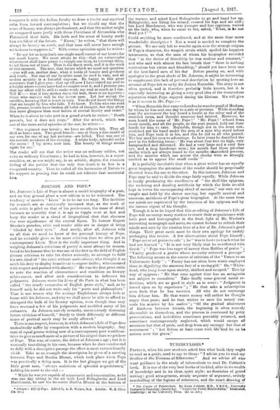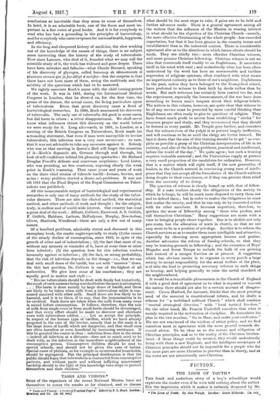TUBERCULOSIS..
PASTEUR, when his now students asked him what book they ought to road as a guide, used to say to them: " I advise you to road my Studies of the DiSOBSOS of Silkworms." And we advise all wins want guidance in the study of tuberculosis to read Dr. Cobbett'a book. It is one of the s.ery hest books of its kind, alike in its wealth of knowledge and in its clear, quiet style: no flourishes of grand writing: good arrangement, steady sequence of argument, orderly marshalling of the legions of references, and the exact-drawing of
• The Covers of Tabereelorie. By Louis Cobbett, sill., F.U.C.S., University Lecturer in Pathology. Cambridge. " Cambridge Public Health Series." IllustratsC Vassbeidtst at the University Press. IL1 la. net.] •
conclusions so inevitable that they seem to come of themselves. In brief, it is an admirable book, one of the finest and most im- portant in a fine series of good books. And it is for everybody to read who has had a grounding in the principles of bacteriology, and for everybody who cares twopence for national health, happiness, and efficiency.
In the long and chequered history of medicine, the slow working out of the knowledge of the causes of things, there is no subject more interesting than the history of the study of tuberculosis. Ever since Laennee, who died of it, founded what we may call the scientific study of it, the work has widened and gone deeper. There have been mistakes and fallacies—what Claude Bernard, spooking of his discovery of glycogen, called beetueoup de tedonneenenle at plusieure erreura qua je fue oblige d rectifier—but the surprise is that there have not been more of them, seeing the multitude and the subtlety of the questions which had to be answerod.
We rightly associate Koch's name with the chief turning-points of the work. It was in 1881, during the International Medical Congress in London, that he showed us, for the first time, the germs of the disease, the actual cause, the living particulate agent of tuberculosis. From that great discovery came a flood of bacteriological researches. In 1890, Koch announced his discovery of tuberculin. The early use of tuberculin did good in some cases, but did harm in others : a bitter disappointment. We shall never know what influences thrust this discovery on the world before we were ready for it. Long afterwards, in 1901, in London, at a meeting of the British Congress on Tuberculosis, Koch made his astounding statement, that even if man were susceptible to bovine tuberculosis, this infection was a very rare occurrence : so rare, that it was not advisable to take any measures against it. Nobody who was at that meeting in Queen's Hall will forget the sensation of it—Koch's dogmatic air. German through and through, his look of -self-confidence behind his gleaming spectacles : Sir Richard Douglas Powell's delicate and courteous scepticism: Lord Lister, who was presiding, no less courteous, exposing clearly the weak point in ICoch's reasoning. Then came years and years of work on the three chief strains of tuberele bacilli—human, bovine, and avian every problem started a dozen sub-problems. It was not till 1911 that the Final Report of the Royal Commission on Tuber- culosis was published,.
All this immeasurable output of bacteriological and experimental researches is only one of many methods for the study of the tuber- cular diseases. There are also the clinical method, the statistical method, and other methods of work and thought : for the subject, truly, is endless and of world-wide interest. Our country has done a great deal of tbe work Allbutt, Cobbott, Eastwood, A. S. Griffith, F. Griffith, Haldane, Latham, McFaulyean, Murphy, Nowshohne, Oliver, Shattuck, Woodhead—these are only a few out of many names.
Of a hundred problems, admirably stated and discussed in this exemplary book, the reader ought especially to study (1) the causes of the steady decline of consumption, since 1863, in spite of the growth a cities and of industrialism ; (2) the fact that most of us, without any memory or reminder of it, have at some time or other been infected: (3) the question how far this infection confers Immunity against re-infection: (4) the fact, or strong probability, that the risk of infection depends on the dosage—i.e., that we can deal with small doses of the bacilli, but not with " massive " doses. On this last problem Dr. Cobbett is one of the highest of all authorities. We give here some of his conclusions ; they are equally good in matter and style :—
"Bovine tuberculosis should be dealt with firmly but tentatively, the result of each measure being switched before the next is attempted.
. . The harm is done mainly by largo doses of bacilli, and those are likely to be taken when milk from a tuberculous wider is con- sumed unmixed with other milk. Small doses are less likely to be harmful, and it is to these, if to any, that the immunization is to be credited. Such doses are taken when the milk from many cows is mixed before consumption. It follows, therefore, that the sale of milk from single cows or from small herds should be discouraged, and that every effort should be made to discover and eliminate cows with tuberculous udders. . . . Lot us accept the principle. In respect .of the human typo of bacillus, which we have already proposed in the case of the bovine, namely that in the main it is the large doses of bacilli which are dangerous, and that small Ones are often harmless or even beneficial by increasing resistance. If this be granted the course is clear infection from dust in the street —indeed all infection at a distance—does not so much used to be dealt with, as the infection in the immediate noighbourhood of the consumptive person. Consumptive children should be sent to special schools, ancl should not be given the care of babies. Special eases of phthisis, as for example in overcrowded households, should be segregated. But the principal desideratum is that the public should learn that tuberculosis is contracted from consumptive patients, and Without panic and without inflicting unnecessary hardship should in the light of this knowledge take steps to protect themselves and their children."



























 Previous page
Previous page